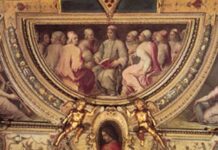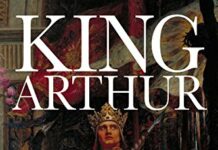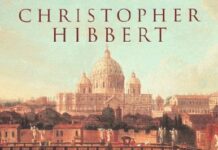
Ebook Info
- Published: 2011
- Number of pages: 337 pages
- Format: PDF
- File Size: 1.46 MB
- Authors: Christopher Hibbert
Description
The name Borgia is synonymous with the corruption, nepotism, and greed that were rife in Renaissance Italy. The powerful, voracious Rodrigo Borgia, better known to history as Pope Alexander VI, was the central figure of the dynasty. Two of his seven papal offspring also rose to power and fame – Lucrezia Borgia, his daughter, whose husband was famously murdered by her brother, and that brother, Cesare, who served as the model for Niccolo Machiavelli’s The Prince. Notorious for seizing power, wealth, land, and titles through bribery, marriage, and murder, the dynasty’s dramatic rise from its Spanish roots to its occupation of the highest position in Renaissance society forms a gripping tale.Erudite, witty, and always insightful, Hibbert removes the layers of myth around the Borgia family and creates a portrait alive with his superb sense of character and place.
User’s Reviews
Reviews from Amazon users which were colected at the time this book was published on the website:
⭐Good historical biographies are hard to come by and this is no exception. The second- hand book was in excellent condition when it arrived. Having read it gave me lots of information but too much repetition and description of the appearance of Cesare Borgia’s vast armies and their accoutrements, and those of his adversaries encouraged the reader to skip pages. Nevertheless the substance of the research and story telling was good .I would recommend this book for historical study as well as general knowledge of the subject and historic period. Amazon never fails to come up with the goods.Anita Grinberg – Australia
⭐This is the first book I have read about the Borgias, and I found it to be a very good . I’ve read all sorts of things about them in other books I have read on the period, but to have a book dedicated to them was great. Cesarean in particular was good to read about. Murder, intrigue and battles is always a great read. Very we’ll written, and not too complicated.
⭐Got hooked on “The Borgias” from the 3 year-running series on Showtime. Really sad it was cancelled but I started reading the historical accounts and novels so I can continue to enjoy the characters – now they have faces!
⭐What else can you say about the Borgias. Mario Puzo designed his characters in The Godfather on these people. This is a great read filled with intrigue, jealousy and corruption.
⭐Bought this for my mom as she likes history. She loves this book and I am now looking for others by this author.
⭐THE BORGIAS WERE SOME KING OF FAMILY.
⭐Prior to reading this book, I didn’t know much about the Borgias beyond a few random tidbits—common belief has it that Lucrezia was a notorious, incestuous poisoner; Cesare a syphilitic megalomaniac. Therefore, this review will concern itself mostly with the way Christopher Hibbert has presented his arguments, rather than how accurate they may be.In general, this book is fast-paced and enjoyable read. Hibbert is eminently readable, and his light, breezy style is ideal for a popular audience. It may prove dissatisfying for fans of “The Borgias” who seek to discover if the series’ salacious portrayal of the family is accurate (as well as revisit all those delightfully disgusting bits), but for readers unfamiliar or intimidated by non-fiction, it may prove an excellent introduction to the literary branch. Of particular note is Hibbert’s ability to remain largely impartial throughout the text, presenting facts as they appear and allowing the audience to form its own opinions. The occasional snippy asides, such as when he remarks that Isabella d’Este’s refusal to return several pieces of statuary to its original owner was “rather mean,” are rare enough that they may be easily forgiven, or at least overlooked.One of the strengths of Hibbert’s text is that he chooses to focus entirely on the Borgias themselves, only diverting from his subjects to briefly discuss those persons who had a large impact on them, either directly or indirectly. For example, the first chapter is spent outlining the Papacy and the popes themselves immediately before Alexander VI/Rodrigo’s elevation, with the purpose being to give readers an idea of the political environment and colleagues he had to work with. Afterwards, the focus remains squarely on Alexander VI/Rodrigo and his family.As for the Borgias themselves, Hibbert mostly focuses on Alexander VI/Rodrigo, the family patriarch, his eldest son Cesare, and his daughter, Lucrezia. His second son Juan is paid some attention as an adult, mostly focusing on his incompetence and his death, possibly by order of Cesare. His youngest son, Jofré, receives even less attention, suggesting that, despite his infamous family, he lead a (relatively) quiet, blameless existence.So, were the Borgias as bad as popular opinion—and Showtime—would have them be? Based solely on this text, the answer appears to be a firm “no.” Alexander VI/Rodrigo certainly was dissolute and power-hungry, but it appears his greatest sins were overindulging his children and overlooking their faults. Lucrezia’s is shown to be nothing more than a silly, hedonistic young woman who, at the same time, was a brilliant politician and administrator. She was neither the evil creature nor the naïve, spoiled innocent popular opinion holds.Lastly, we come to Cesare. Here, he appears to be exactly what his reputation is—a murdering, raping, warmongering thug. A sulky, unwilling cleric, his release from religious vows only allowed him to cast off the few moral shackles his father managed to bind him with. His belief in his own infallibility, his inflated sense of entitlement, is clearly expressed through the sources Hibbert cites again and again. Cesare, though enormously talented, proves himself to be a thoroughly disgusting human being. Here, Borgia fans may find something of what they are looking for, though Hibbert does nothing to romanticize his subject’s actions.To conclude, this is a satisfying overview of the Borgias, and a worth introduction of this family to the popular reader. However, at a mere 315 pages (sans bibliography and index), Hibbert’s text is far too short to provide a complete picture of the lives of so many people. Thus, it whets, rather than satisfies, the appetite.
⭐Let’s begin with Mario Puzo’s THE FAMILY. Puzo has had a life-long passion for the Borgias, as have I. His book is both hilarious and hot. Take Astorre Manfredi. The kid was 18 and his brother 15. Astorre was the most handsome lad living at the time. Painters came from all around to do his portrait. He had also inherited a small kingdom that Cesare Borgia coveted. So Cesare convinces the kid to give him his spread in exchange for a few weeks in Rome, the then-equivalent to today’s Vegas. Because Astorre knew he had no choice (due to Cesare’s military superiority), he consented. The next scene has Astorre and Cesare in a hot tub (I’m not kidding!), although this one is of stone. Astorre puts his hand on Cesare’s thigh, but Cesare gently moves it away, saying he’s not that kind of guy (again, I’m not kidding). Later I’ll tell you what happens to the most beautiful boy in Italy. Another scene: Cesare is in the apartments of his father, Pope Alexander VI, who’s at his table writing. Cesare’s caressing his sister Lucrezia but because he’s not too gentle, Lucrezia calls for her father’s assistance. This comes as no surprise since the old man is also an old pervert of the very worst kind (and as there’s no real justice in life, he eventually dies in bed–he should have rotted in Hell, but there’s also no Hell). The Pope her father takes over the caressing and then prompts his son to enter, deftly, nevertheless well-used portals, encouraging the boy to go gently by gently stroking his butt. One star.E.R. Chamberlin’s THE FALL OF THE HOUSE OF BORGIA is old but complete. We learn that slaves could be bought for as little as six ducats, that Tartars were the best workers and Russians and Circassians best for one’s bed. Prostitutes died penniless, justifying the saying the `’Venus reduces her worshipers to her own nudity.” We learn that the gorgeous Astorre and his brother were murdered `’after they had sated the lust of a certain person,” that person being Pope Alexander VI. One of Cesare’s lieutenants was such a tyrant that `’he had thrust a clumsy page boy into the fire, pressing him down with a foot while the boy burned alive.” Chamberlin doesn’t hesitate to reveal gossip concerning Cesare, that he killed his own brother Juan in order to have access to Juan’s wife Sancia and because both brothers, jealous of each other, wished to continue incestuous access to their sister Lucrezia.Ivan Cloulas in THE BORGIAS brings us this quote from a playwright: Do people say that I am both your father and your lover? Let the world, that heap of vermin as ridiculous as they are feebleminded, believe the most absurd tale. The great law of the world is … to grow and develop what is strongest and greatest in us. Walk straight ahead. Leave hesitation and scruples to small minds.Marion Johnson in his THE BORGIAS tells us that Cesare had addressed questions to the scientist of the papal court about poisons; he wished to know the ways of poisoning cups, perfumes, flowers, saddles and ever stirrups (!!!).I did read Rafael Sabatini’s book THE LIFE OF CESARE BORGIA, but found it a bit outdated (1929).Christopher Hibbert’s THE BORGIAS AND THEIR ENEMIES tells us about Manfredi: `’Four days later the corpse had been fished out of the Tiber, drowned by a stone tied round his neck. This young man was of such beauty and stature that it would not be possible to find his equal among a thousand of his contemporaries.” About Cesare: `’Cesar had fallen sick again of that illness of his. Now the flowers (as the syphilitic rashes were euphemistically known) are starting to bloom again.” When Cesare married: `’He had consummated the matrimony eight times, but these eight times consisted of two before supper and six at night.” Concerning the Pope, Cesare and his daughter during an orgy: `’At the end they displayed prizes, silk mantles, boots, caps and other objects which were promised to whomsoever should have made love to these prostitutes the greatest number of times.” When it was reported to the Pope that his new son-in-law was sleeping with others than Lucrezia (`’It was reported that he took his pleasure with other women during the day”) the Pope said, `’Being young it does him good.” Naturally, this is my favorite book. My own books can be found on Amazon under Michael Hone.
⭐I loved the TV series of the Borgias, and thought I would find out more about them. This book details the careers of Rodrigo Borgia (later Pope Alexander VI), his sons, Juan and the infamous Cesare, and his daughter, Lucretia. The Pope tried to build a family empire around his children and they were all ruthless in their pursuit of power, but once the Pope was dead, it all fell apart. An interesting history with fascinating people. A good read.
⭐For a tale of such a turbulent age, and the dominant, corrupt family of the age, Christopher Hibbert’s The Borgias is a surprisingly heartfelt read.Beginning with a brief, yet detailed, chronicle of the Borgia predecessors, Hibbert takes us immediately to the Borgia family that matters most, that of Rodrigo Borgia, later Alexander VI, and his children Cesare, Juan, Jofre and Lucrezia.Hibbert spares few details, fleshing out and giving a real feel for the Italy of the day, and examining the nature of church and politics, something truly inseparable in those times.Most of the work focuses on Cesare, and his military campaigns, focusing more on his time as a Duke, and less of his time as a Cardinal.While the Pope dies two thirds of the way into the book, and soon after, Cesare, the remainder of the book focuses on Lucrezia, who comes across, less as the villainess that history has marked her, and more as a tragic character.The Borgias is incredibly readable and one struggles to put it down. This is the third book this reviewer has read by the late Christopher Hibbert, the others been The Rise and Fall of the House of Medici, and The French Revolution, and it certainly will not be the last.In short, a gripping, yet surprisingly heartfelt, historical chronicle.
⭐On the one hand this is a better read than Sabatini’s book in the literal sense. It was informative and interesting BUT there are two major negatives. First it both omits key events and detail such as Cesare’s death: it gets a one line mention! Indeed there are only a couple of almost incidental sentences about him after his escape in Spain! Yet at the same time it goes off into detail about artists and events unrelated to the Borgias. Secondly It is not sufficiently critical of the primary sources, appearing to accept all comments at face value and never considering enmity, partiality etc. I was intrigued by his suggestion that Lucrezia had affairs with Bembo and Gonzaga, and the implied suggestion that one of her Este offspring was really Gonzaga’s. I should have liked to see the evidence for that included much more fully. A plus is that it did at least translate what required translating, but again there were no maps, pictures etc. I shall end here since other reviewers have said everything else!
⭐This is a brisk family biography which delights in retelling all the most scurrilous and decadent stories that still stick to the Borgia name: uncomfortably close family relations, murder, decadence, corruption and power.In this sense it is an entertaining read, but it’s not one which re-evaluates the sources, or draws attention to their own biases according to the context and political allegiances of the writer.If you’re a general reader looking for a gossipy re-telling of Borgia history then this is informative and entertaining.
⭐I thought that from the description that this book would include details about the Borgias early life in Xàtiva in Spain. I will be visiting there soon and wanted some background but there isn’t really any information about that. However what the book does cover is a fascinating, well-researched look at the life of the Borgias and how their life fitted into the time, and place, that they were living. It’s one of those books that you fly through without really noticed how many pages you’re reading at a time. I recommend it for anyone interested in the Borgias, the papacy or Rome.
Keywords
Free Download The Borgias in PDF format
The Borgias PDF Free Download
Download The Borgias 2011 PDF Free
The Borgias 2011 PDF Free Download
Download The Borgias PDF
Free Download Ebook The Borgias





